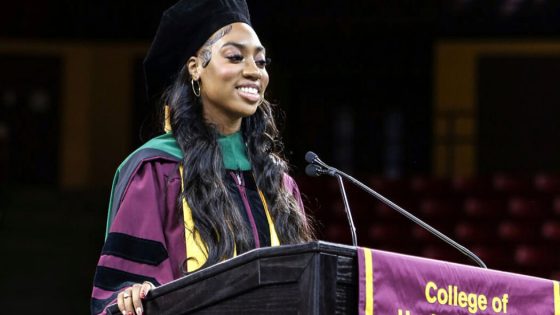When Dorothy Jean Tillman II successfully defended her dissertation in November 2023 to earn her doctoral degree from Arizona State University, she couldn’t wait to share the news with her best friend.
“It was a surreal moment,’’ Ms. Tillman said, “because it was crazy I was doing it in the first place.”
Ms. Tillman, at only 17, became the youngest person to earn a doctoral degree in integrated behavioral health from Arizona State’s College of Health Solutions, all before she was eligible to vote. Earlier this month, Ms. Tillman, now 18, took part in Arizona State’s commencement ceremony and delivered remarks as the outstanding 2024 graduate at the College of Health Solution’s convocation.
Lesley Manson, program director for the doctorate of behavioral health at Arizona State and Ms. Tillman’s doctoral chair, said Ms. Tillman displayed extraordinary perseverance, hard work and dedication for her young age, tackling every challenge head-on.
“She can serve as a real role model,” Ms. Manson said.
Ms. Tillman, called DJ by her family and friends, was an early bloomer. She grew up in Chicago and was home-schooled from a young age, first in a group setting through online classes, and then by her mother, Jimalita Tillman, a single parent with a background in community theater.
Ms. Tillman was part of a gifted program before transitioning to home-schooling. Jimalita Tillman continued her daughter on an accelerated track: By the time she was 8, she was taking high school classes. While most 9-year-olds were learning math and reading, Ms. Tillman was starting college online.
At the time, they lived with Jimalita Tillman’s mother, Dorothy WrightTillman, a civil rights activist who worked alongside the Rev. Dr. Martin Luther King Jr. and was a Chicago alderman. Ms. Tillman is her grandmother’s namesake (hence the II at the end of Ms. Tillman’s name).
During her early college days, Ms. Tillman’s classroom was often a Starbucks in Chicago, and her days began as soon it opened, she said. Her go-to order was an iced peach green tea with lemonade.
“Around the time when kids went to lunch, we’d be closing the computer,” said Ms. Tillman, who said her discipline and focus come from her grandmother.
Because of her age, Ms. Tillman lived at home while pursuing her higher education, and most of her coursework was online — a challenge for a self-described social butterfly. “I do love meeting new people and talking to people and understanding them and how their brains work,” she said. She found other ways to stay connected with friends through after-school activities.
At 10, she earned her associate degree in psychology at the College of Lake County in Illinois. At 12, she received her Bachelor of Science in humanities at Excelsior College in New York, and at 14, she earned a Master of Science from Unity College in Maine. She chose those fields because they can help scientists “understand why people treat the environment the way they do,” she told Time for Kids in a July 2020 interview.
Ellen Winner, a professor of psychology at Boston College and the author of “Gifted Children: Myths and Realities,” said that children like Ms. Tillman have a motivational intensity she calls a “rage to master.”
“One of the reasons they push themselves is they have a high, innate ability of some kind, and so learning, in whatever they are gifted in, comes easily to them and it’s very pleasurable,” she said. Schools are often not equipped for such gifted children, she added, which may lead parents to home-school their children. The trade-off, she and some experts say, is missing out on socialization and learning with children their age.
“There’s no perfect solution to kids like this,” Ms. Winner said.
Jimalita Tillman said she was sure her daughter was finished with higher education after earning her master’s degree. Ms. Tillman had just launched an organization to support Black youth in Chicago interested in STEM and the arts called the Dorothy Jeanius STEAM Leadership Institute. It was 2020, just after the beginning of the pandemic.
She was surprised when her daughter said she wanted to pursue her doctorate, and even tried to dissuade Ms. Tillman. But Ms. Tillman wanted to help young people with their mental health. She told her mother to trust her.
“I had to follow her lead,” Jimalita Tillman, 42, said.
Ms. Tillman was accepted into the management concentration at Arizona State’s College of Health Solutions, an online doctorate program. Her thesis on developing programs to reduce the stigma for college students seeking mental health services was based on a study she conducted for an in-person internship at the Illinois Institute of Technology in Chicago. Ms. Tillman hopes her story resonates with girls who are talkative, outgoing “out-there kind of girls who are trying to figure themselves out but are very smart.”
“I want them to see someone who has taken that energy, sparkle and excitement and packaged it in a way that is classy and beautiful,” she said.
Ms. Tillman may now have her doctorate, but she’s also excited about teenage things — like attending a prom. On Saturday, she going as her best friend’s date to his senior dance. They’re taking an Escalade outfitted with stars on the ceiling, she said, a feature she requested and that her mother made happen.
Ms. Tillman has been focused on school and her professional pursuits, and she plans to host her institute’s summer camp again. Then, she said, she plans to take a beat and have a “fun, teenage summer,” doing things she loves, discovering new hobbies and figuring herself out in the process.
“I want to focus on who I am,” she said.
Source Agencies


